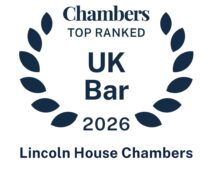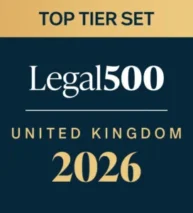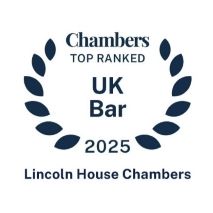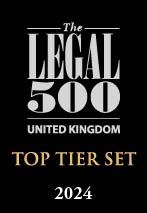About Hugh Barton
“An advocate who cowers before neither opponent nor Bench, and is always ready to stand up and be counted in court”
“An iron fist in a velvet glove, he adroitly adapts his manner to the necessities of the case. A good choice for those wanting someone who can take a tough stance.”
“The best Claimant barrister in the North and respected for having a serious crime practice as well as acting in civil actions against the police.” – Chambers & Partners
OVERVIEW
Hugh Barton joined Lincoln House Chambers in 2002 after he and his family relocated from London to the North West. He specialises in serious criminal work, with particular emphasis on defence work and civil actions against the police. He is generally accepted to be the leading barrister for Claimants in this area in the North. He is described recently by Chambers UK as having “highly sought after advocacy skills” and the ability “to really cross-examine”.
Hugh was born in London in 1963 and was educated at Latymer Upper School in Hammersmith. He read English and Classics at Exeter University before working and travelling in Central America (at first with an International Brigade in Nicaragua and then on his own). On his return, he started working for solicitors in London. Firstly doing Criminal work with Hodge Jones and Allen and later doing civil work with Leigh Day and Co. He worked extensively with Martin Day on their ground breaking High Court litigation against British Nuclear Fuels. Over this period he completed the conversion course and then Bar Finals.
Prior to his move North, Hugh practiced from Doughty Street Chambers in London. Initially he enjoyed a general common law practice which included crime, family, civil litigation and public law. But after about 5 years he began to specialise on criminal defence work, police actions, Human Rights and appellate miscarriage work (frequently pro-bono). He cut his teeth on Benn and others, then the longest ever VAT fraud prosecution which concluded in the House of Lords. He was soon being instructed for the defence in numerous murder trials at the Central Criminal Court.
He advised and then acted in numerous Appeals in the Court of Appeal via the Criminal Cases Review Commission. He also developed an interest in pro-bono appeals to the Privy Council in capital murder cases from the Caribbean.
Having joined Lincoln House Hugh has set about establishing himself in the North West. He has begun prosecuting for the first time and enjoys the challenge of prosecution briefs after years of defending. There are obvious parallels between prosecuting a criminal case and acting for a claimant in a civil trial. On the defence side Hugh has quickly built up a heavy weight practice. Set out below are just a few examples of his recent cases.
Bird and others (murder and robbery of money lender) Defending. Client had sacked previous 2 legal teams. Defendant discharged on first day of trial after Hugh’s legal submissions.
R v Hanna – Defending – Fraud involving environmental charity.
R v Hussain and others – Election fraud.
R v Patel and others – Leading junior defending in multi-million revenue fraud.
R v Tufail – £2 million money laundering and related confiscation proceedings
R v Makwiza – Conspiracy to defraud, nationwide benefit fraud.
R v Carroll – Conspiracy to rob – lengthy trial after which defendant acquitted after successful challenge to prosecution DNA evidence and cell site evidence.
R v Midgley – £3 million confiscation proceedings linked to cigarette importation.
R v Bolton – Murder – death from asthma attack after assault, complex causation issues with expert evidence.
R v Metcalfe – High profile case in which a father shopped his son to the police for possession of a firearm. 5-year minimum term was not imposed due to “exceptional circumstances”.
R v Motl – brutal murder for money of defendants’ employer before fleeing to Czech Republic.
R v Molloy – large scale conspiracy to supply cannabis between England Wales and Scotland. Successfully argued that entire proceedings a nullity and trial collapsed.
R v Webb – conspiracy to cause explosions-sophisticated attacks Nationwide on banks and cashpoints gaining access through explosions caused with oxy acetylene gas first offences of this type in this country.
R v Clark – Multi-Million pound multiple importations and distribution of all different class A and B drugs and associated money laundering. C said to be at the very top of the organisation).
R v Thompson – Conspiracy to supply Cocaine, Heroin and Firearms.
R v Robinson – Conspiracy to supply Cocaine.
R v Al Khatib – Missing body honour killing murder involving 3 stateless Palestinian brothers
Hugh is frequently instructed in cases involving serious sexual assaults and historic abuse and sexual assaults on children. He is known for his sensitive but effective cross-examination of child witnesses. Recent cases (defending and prosecuting) include:
R v S – Multiple rapes of different partners over 17-year period.
R v Jackson – multiple historic rapes of children.
R v D – rape of partner whilst defendant on licence having been released from sentence for raping former partner.
R v N – alleged marital rape and domestic violence in Vietnamese marriage.
R v J – alleged marital rape and serious domestic violence in Pakistani arranged marriage.
R v H – historic sexual abuse of grandchildren.
R v O – rape of vulnerable teenager who was picked up by defendants outside the gates of her care home.
Hugh has also been instructed the represent third party interests in such cases in relation to issues of disclosure. He has intervened on behalf of public bodies such as local authorities who were in possession of sensitive relevant material and represented family members of complainant’s who objected to the disclosure of confidential material (in breach of their Article 8 rights). In the area of sentencing he has particular expertise in “dangerousness” and mandatory minimum terms (and how to avoid them). Hugh is known for his successful legal submissions and the clarity of his skeleton arguments. He is fully conversant with the jurisprudence of the ECHR and frequently relies on it in his submissions on Bad Character, Hearsay, Confiscation and Inferences from Silence. For example since the Court of Appeal decision in Horncastle (on hearsay) he has stopped three different prosecutions after successfully excluding the hearsay evidence.
He has continued to enjoy conspicuous success in the County Court and High Court in his Police Action work. It is only in the last couple of years that he lost his first police action trial since moving to Manchester. Recent victories have led to damages in excess of £100,000. In the case of Gee V Merseyside Police he successfully argued for the admission of “similar fact” evidence into the civil trial. This was all the more remarkable as it related to allegations of misconduct made against officers made in the course of criminal trials in which the defendants had been convicted and the criminal prosecution of officers that resulted in acquittals. Having appealed to the High Court and lost, the police duly settled. Hugh was also instructed on behalf of members of the Viva Palestina convoy who sued Greater Manchester Police as a result of their arrest and detention under section 41 of the Terrorism Act. The case has now settled in the Claimants’ favour with a significant pay out. He also acted for a former IRA informer who was the subject of an assassination attempt after his identity was disclosed.
In the case of Koraou he argued that GMP had breached their duty to carry out an effective criminal investigation under Article 3 after K was assaulted and his ear was bitten off. The case was very recently heard by the Court of Appeal together with the linked appeal of DSD & NBV. Judgement has been reserved. Hugh is currently instructed in a number of ongoing police actions, which include: W relates to a potential claim in negligence and breach of Article 3 (breach of duty to protect and investigate) against Police, Local Authority and Probation. An extremely vulnerable child was groomed and sexually abused after being placed at a special school located in very close proximity to a hostel housing a convicted sex offender. M who suffered a cardiac arrest after being tasered twice. J a vulnerable youth wrongly prosecuted for Arson (possible claims under Article 6, Misfeasance and Malicious Prosecution. C whose conviction for murder was quashed by the Court of Appeal (R V Joof ) after a major CCRC led investigation found extensive corruption amongst the police investigation and linked witness protection programme.
Hugh continues to lecture on Human Rights and Criminal Law. In addition to the above he has also been instructed in inquests and applications for judicial review (most frequently related to POCA and enforcement).
Hugh Barton is a barrister who is drawn to difficult and challenging cases. Regardless of whether the difficulties are a result of the demands of the lay client or the legal complexities of the case, he is at his best when he is being stretched to the limit. He is someone who will always seek out fresh professional challenges. He is prepared to act on a Conditional Fee and even Pro Bono basis where the justice of the case requires it. He is currently instructed in an appeal out of time against an old IPP imposed on a 14-year old youth under the old “Dangerousness Sentencing Regime”.
More recently, Hugh has been instructed in professional regulatory work. Over the last 18-months he has been regularly instructed by the General Medical Council. This includes presenting at tribunal hearings but also High Court applications. He is keen to expend this area of practice.
Practice areas
- Crime & Fraud
- Pre – Charge
- Fraud, Business Crime & Financial Regulation
- Serious Crime
- Terrorism
- Murder & Manslaughter
- Sexual Offences
- General Crime
- Appeals
- POCA, Confiscation & Restraint
- Regulatory & Tribunal
- Professional Discipline (Medical Professions)
- Civil Law
- Actions Against the Police
- Judicial Review
Member News
Awards






